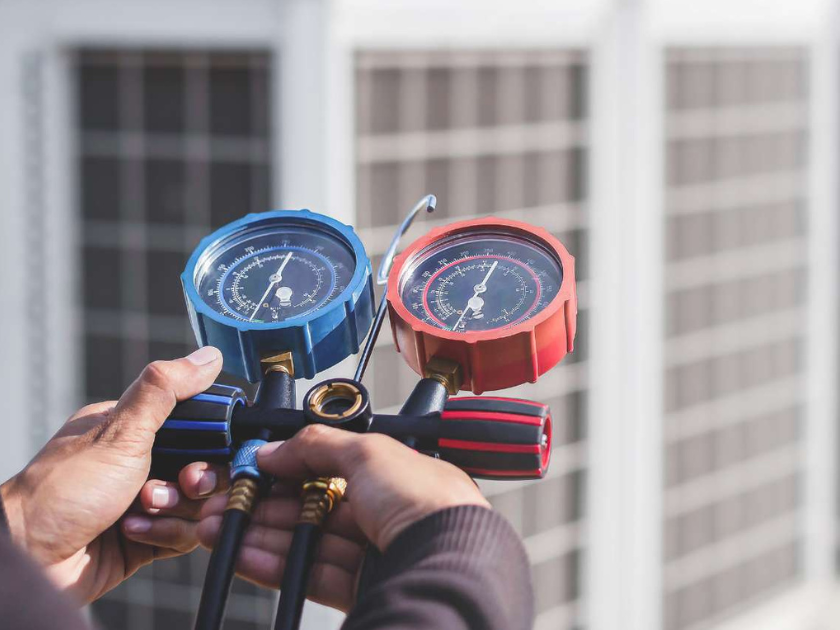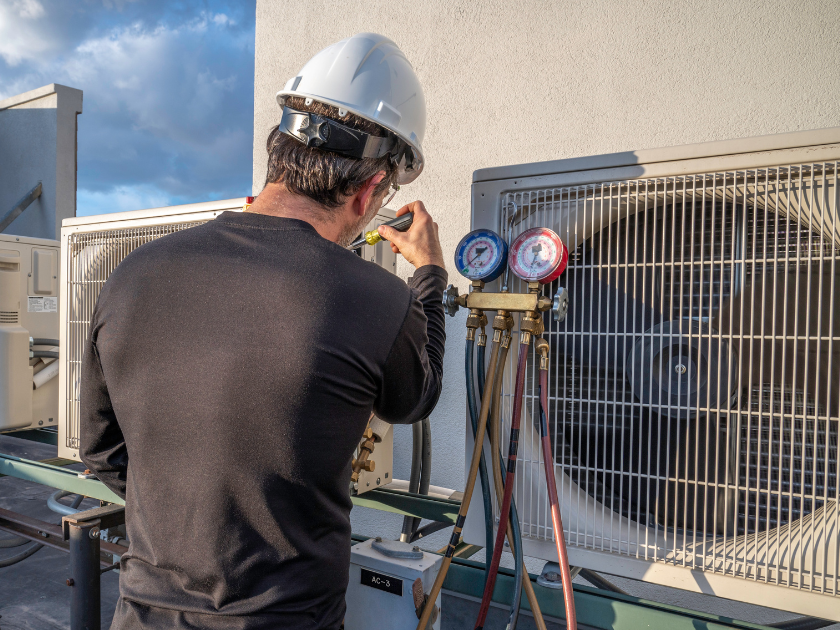
HVAC systems (Heating, Ventilation, and Air Conditioning) are essential for creating comfortable and healthy indoor environments in residential and commercial properties. These systems regulate temperature, airflow, and humidity, ensuring spaces remain comfortable year-round while improving indoor air quality. For businesses, a reliable HVAC system is crucial for productivity and customer satisfaction while it provides comfort and safety in homes.
Cooper Weston specialises in providing expert HVAC maintenance solutions, offering tailored services to keep your system running smoothly and efficiently. Whether for homes or businesses, our skilled technicians deliver reliable care to meet your needs.
Get in touch with us today for a free quote and to book our maintenance services.
Why is HVAC maintenance important?
- Improved efficiency
- Prevention of breakdowns
- Enhanced air quality
- Longevity
Regular HVAC maintenance is crucial for ensuring your system operates efficiently and reliably. By keeping the components clean and properly calibrated, maintenance helps your system run optimally, reducing energy bills and minimising unnecessary energy consumption.
Maintenance also helps prevent breakdowns, as routine inspections allow technicians to identify and address small issues before they escalate into expensive repairs. Additionally, clean filters and ducts improve air quality, providing a healthier indoor environment free of dust, allergens, and pollutants.
Over time, regular care significantly enhances the longevity of your HVAC system, protecting your investment and ensuring consistent comfort for years to come. A poorly maintained system is more prone to breakdowns, reduced efficiency, a shorter lifespan, and potentially premature replacement.
If unexpected breakdowns occur, call us for our reactive maintenance services, which offer rapid response times 24/7.
What happens during HVAC maintenance?
Inspection and diagnosis
The maintenance process begins with a thorough assessment of the HVAC system. Technicians perform visual inspections and performance checks to evaluate the overall condition. Key components like belts, fans, and electrical connections are inspected for wear and tear, ensuring the system is functioning correctly, safely and efficiently.
For systems with both a furnace and air conditioner, technicians will check the heating elements and cooling coils to verify they are operating efficiently. This dual inspection ensures that the entire system is prepared to handle seasonal demands, whether for heating in winter or cooling in summer.
Cleaning key components
To ensure optimal performance, technicians clean or replace air filters, which improve air quality by removing dust, allergens, and other pollutants. Clean filters also promote proper airflow, reducing strain on the system and enhancing energy efficiency. Outdoor units are cleared of debris such as dirt and leaves, and evaporator and condenser coils are cleaned to maintain effective heat exchange and prevent overheating.
Additional components like blowers, fans, and ductwork are inspected and cleaned as needed to ensure smooth operation and unobstructed airflow. These essential tasks not only improve the system’s efficiency and reliability but also extend its lifespan, reducing the likelihood of costly breakdowns.
System testing
Technicians test and recalibrate thermostats to ensure accurate temperature and climate control. They check for proper airflow and consistency across the system. For relevant systems, such as air conditioning units, refrigerant levels are inspected and topped up if necessary to ensure effective cooling efficiency and performance.
Lubrication and adjustments
Moving parts are lubricated to reduce friction and wear, which not only ensures smooth operation but also minimises energy consumption and noise during system use. This routine maintenance step helps to prolong the system’s lifespan and prevent unnecessary breakdowns.
HVAC technicians will also tighten electrical connections and mechanical components, ensuring the system operates safely and reliably. This process helps prevent potential issues, such as loose wires that could cause short circuits or mechanical failures that could disrupt climate control.
Safety checks
Finally, technicians will inspect the system for gas or refrigerant leaks, ensuring compliance with safety standards and regulations. These checks safeguard both occupants and the HVAC system, guaranteeing a safe and efficient operation.
Regular HVAC maintenance includes these crucial steps to keep your system running smoothly, efficiently, and safely.
How often should HVAC maintenance be done?
HVAC systems typically require maintenance once before the heating season (autumn) and once before the cooling season (spring). This schedule ensures the system is prepared to handle peak usage periods and minimises the risk of breakdowns when you need it most.
However, the exact frequency of maintenance may vary depending on several factors:
- Property type: Commercial properties with heavy system usage may require more frequent checks compared to residential properties.
- System usage: Systems running year-round, such as those in high-traffic businesses or extreme climates, may need quarterly servicing.
- Age of equipment: Older systems often need more frequent inspections to address wear and tear or potential efficiency issues.
Consulting with an HVAC professional can help tailor a maintenance schedule that best suits your specific system and usage needs.
Signs your HVAC system needs maintenance
There are several warning signs that indicate your HVAC system may need immediate attention:
- Uneven airflow: Inconsistent temperatures or weak airflow in certain areas of your home or building can signal issues with ducts, fans, or filters.
- Unusual noises: Banging, rattling, or hissing sounds often point to loose components, motor issues, or refrigerant leaks.
- Increased energy bills: A sudden spike in energy costs often means your system is overworking, possibly due to dirty filters, blocked vents, or malfunctioning components.
Addressing these signs promptly can prevent small problems from escalating into costly repairs or complete system breakdowns. Regular maintenance not only resolves these issues but also improves system efficiency, extends its lifespan, and ensures consistent performance.
HVAC services with Cooper Weston
Expertise you can trust
At Cooper Weston, our team of expert technicians brings extensive experience in installing and servicing HVAC systems for both residential and commercial properties. With a deep understanding of various systems and their unique requirements, we ensure your HVAC setup is maintained to the highest standards.
Tailored maintenance plans
We recognise that every property is different. That’s why we offer customised maintenance plans designed to meet your specific needs, whether it’s a routine annual check or a more frequent servicing schedule for high-usage commercial systems.
Advanced tools and techniques
Our technicians use the latest tools and technologies to conduct thorough inspections and servicing. From diagnosing complex issues to ensuring precision in adjustments, we guarantee an efficient and reliable HVAC system to keep your property comfortable year-round.
Schedule HVAC maintenance with Cooper Weston
Scheduling HVAC maintenance with Cooper Weston is straightforward and convenient. You can book a service by visiting our contact us page or calling 0800 669 6229. Our experienced team works across London and the South of England, and we’re ready to assist you with your maintenance needs.
Book today to maintain the efficiency and reliability of your HVAC systems and benefit from our expertise, professional service, and quick response times.

HVAC maintenance FAQ
How long does an HVAC maintenance visit take?
Most routine HVAC maintenance visits take 1 to 2 hours, depending on the size and complexity of the system. Larger or more intricate systems, such as those in commercial properties, may require additional time to ensure all components are thoroughly inspected and serviced. Regular maintenance helps keep the process efficient, reducing the time needed for each visit.
Do I need HVAC maintenance if my system is new?
Yes, even a new HVAC system will require routine maintenance. Regular servicing helps keep the system running efficiently, ensures all components are working correctly, and prevents minor issues from escalating into larger problems. Most manufacturer warranties require proof of regular maintenance to remain valid, making it essential to schedule inspections even for a new system.
Are there safety risks associated with neglected HVAC systems?
Yes, neglecting HVAC systems can pose serious safety risks. Over time, lack of maintenance may lead to gas or refrigerant leaks, which can be hazardous to health and, in some cases, flammable. Faulty or worn electrical components can create electrical hazards, including the risk of fires.
Neglected systems often result in compromised air quality, allowing allergens, dust, and pollutants to circulate indoors, which can negatively impact respiratory health. Regular maintenance helps mitigate these risks, ensuring safe and efficient operation.






